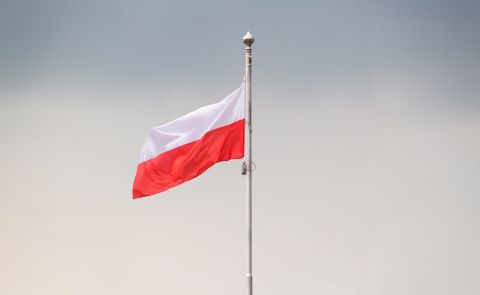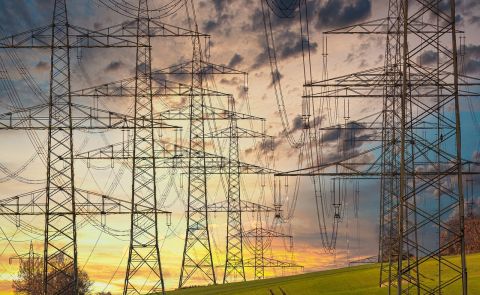
Energy Ministers Gather in Baku to Discuss Future Expansion of Southern Gas Corridor and Green Energy Initiatives
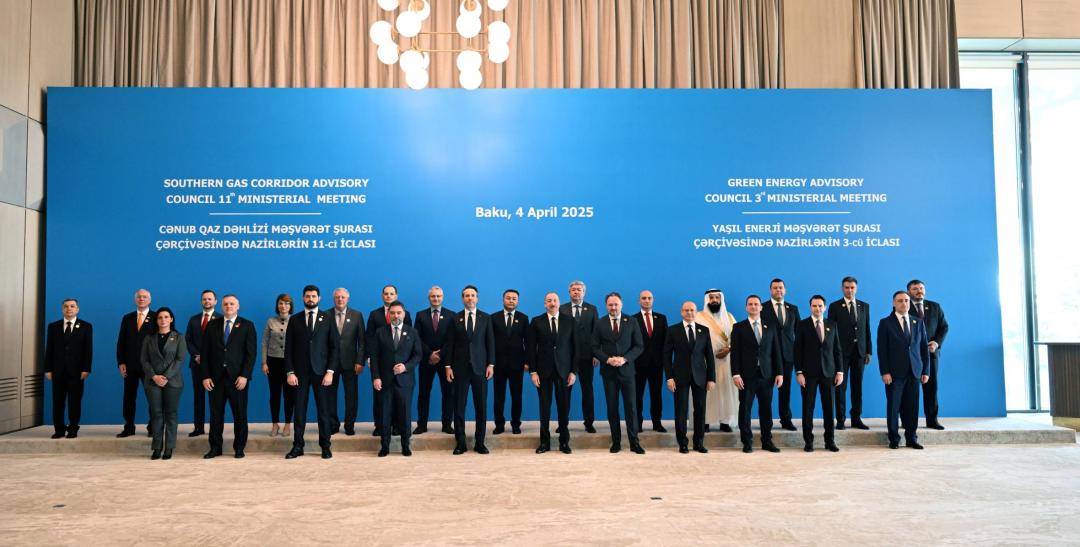
On April 4, Azerbaijani President Ilham Aliyev attended the 11th Southern Gas Corridor Advisory Council and 3rd Green Energy Advisory Council Ministerial Meetings in Baku. Discussions centered on expanding energy cooperation, including gas supplies to Europe, advancing green energy initiatives, and pursuing joint projects with Türkiye. Key figures, including Energy Minister Parviz Shahbazov, EU Commissioner Dan Jørgensen, and others, emphasized diversification, sustainability, and regional collaboration as critical to energy security.
President Aliyev announced that Azerbaijan currently supplies natural gas to 12 countries, 10 of which are in Europe, including eight EU member states. He highlighted Azerbaijan’s role in creating or expanding gas distribution networks in several of these countries, which will further broaden its export reach. Aliyev noted that the Southern Gas Corridor—comprising the South Caucasus Pipeline, TANAP, and TAP—operates at full capacity, but stressed the need for expansion and additional financing. He urged international financial institutions to reconsider their reluctance to fund fossil fuel projects.
Aliyev also underscored the importance of oil and gas fields like Azeri-Chirag-Gunashli, Shah Deniz, and Absheron in ensuring energy supplies for multiple nations, with more fields expected to come online in the coming years. He credited multilateral cooperation for the successful construction of major pipelines such as Baku-Tbilisi-Ceyhan, Baku-Supsa, and the Southern Gas Corridor.
Azerbaijani Energy Minister Parviz Shahbazov called for recalibrating energy policies, investments, and priorities amid global market volatility and geopolitical challenges. He emphasized that natural gas remains vital for energy security, requiring immediate investment in gas fields and infrastructure. Shahbazov highlighted diversification as a cornerstone of sustainable energy security, noting that Azerbaijani gas and the Southern Gas Corridor (SGC) are essential for Europe. He added that Azerbaijan has significantly expanded its energy export geography while maintaining its reputation as a reliable partner.
EU Commissioner Dan Jørgensen stressed the Southern Gas Corridor’s role in reducing the EU’s reliance on Russian gas. He noted that Azerbaijani gas will remain crucial during the EU’s transition to net-zero emissions and advocated for enhanced cooperation in trade, energy security, and grid development. Jørgensen also proposed establishing a green energy corridor between the South Caucasus and the EU.
Slovenian Minister of Environment, Climate, and Energy Bojan Kumer expressed Slovenia’s support for deeper gas sector collaboration with Azerbaijan, calling it a dependable partner. He emphasized the growing importance of energy diversification and green energy, urging joint action on climate issues ahead of Azerbaijan’s COP29 presidency and expressing interest in hydrogen and clean energy technologies.
Romanian Energy Minister Sebastian-Ioan Burduja reaffirmed Romania’s commitment to expanding the Southern Gas Corridor, discussing its extension to Southeastern Europe and the Balkans as a boost to regional energy security.
Bulgarian Energy Minister Zhecho Stankov outlined plans for the Vertical Corridor initiative, which will enable the transport of additional gas volumes and enhance Bulgaria’s energy capacity, particularly for imports from Greece and LNG terminals.
Kazakh Deputy Energy Minister Sungat Yessimkhanov announced that Kazakhstan, Azerbaijan, and Uzbekistan are collaborating on a new model of regional energy cooperation, focusing on both traditional and green energy sources. Speaking at the meetings, he highlighted Kazakhstan’s sustainability efforts, including projects to utilize associated gas. Yessimkhanov noted progress in expanding energy export routes along the Caspian Sea and developing oil and gas infrastructure, including an agreement with Azerbaijan to transport 1.5 million tons of Kazakh oil annually from Baku to Supsa. He described the Green Energy Corridor initiative as encompassing low-carbon solutions like hydrogen technologies and carbon footprint reduction, citing a recent strategic partnership agreement among Kazakhstan, Azerbaijan, and Uzbekistan in green energy production and transmission. Yessimkhanov expressed Kazakhstan’s openness to joint projects on green hydrogen infrastructure and expanding the Southern Gas Corridor as a platform for sustainable energy.
Matt Kirkham, BP’s Vice President for projects in Azerbaijan, Georgia, Türkiye, the Middle East, and North Africa, reported that Southern Gas Corridor operators have increased annual Azerbaijani gas supplies to Europe to approximately 12 billion cubic meters. He announced plans to raise this to 14 billion cubic meters by 2026, emphasizing the Shah Deniz field’s role in safe and efficient gas production. In 2023, Shah Deniz produced 28 billion cubic meters—exceeding targets—and remains BP’s largest gas operation, with a daily capacity of 79 million cubic meters. Kirkham noted that over 12 billion cubic meters were delivered to Europe via the SGC in 2024, with ongoing efforts to expand the Trans Adriatic Pipeline (TAP) to reach 14 billion cubic meters by 2026. He also highlighted safety and sustainability improvements at Shah Deniz, including the activation of all five underwater flanks by October of the previous year and plans for six additional production wells.
Kirkham further detailed plans to launch the Shah Deniz Compression (SDC) platform by 2029, with ongoing environmental and social impact assessments in collaboration with the Azerbaijani government and public. A final investment decision is expected by mid-2025, with construction starting in 2026. The project aims to access low-pressure gas reserves using an offshore platform with electrically powered compressors, operating remotely to electrify the Shah Deniz Bravo platform and eventually the entire field, extending production well beyond the current decade.
On the same day, President Aliyev met with Türkiye’s Energy and Natural Resources Minister Alparslan Bayraktar, discussing expanded cooperation in hydrocarbons and electricity. They praised SOCAR’s partnerships with Turkish Petroleum (TPAO) and BOTAŞ, exploring joint projects across Azerbaijan, Türkiye, and beyond. The meeting also addressed electricity exports, including SOCAR’s sales to Türkiye and a forthcoming agreement between Azerbaijan’s “AzerEnerji” OJSC and Turkey’s TEİAŞ to export 75 megawatts from Nakhchivan. Additionally, a memorandum on green energy cooperation among Azerbaijan, Georgia, Türkiye, and Bulgaria was set to be signed that day.
Azerbaijan, Türkiye, Georgia, and Bulgaria Sign MOU on Green Energy Transmission Project
On April 4, the 2nd Ministerial Meeting on the Green Electricity Transmission and Trade Project took place in Baku during the Southern Gas Corridor and Green Energy Advisory Council meetings. Attendees included Azerbaijan’s Energy Minister Parviz Shahbazov, Georgia’s Deputy Minister of Economy and Sustainable Development Vakhtang Tsintsadze, Türkiye’s Energy and Natural Resources Minister Alparslan Bayraktar, and Bulgaria’s Energy Minister Zhecho Stankov.
The talks focused on establishing an interregional green energy infrastructure to enhance energy security and promote cooperation in transporting Azerbaijan’s renewable energy resources. The meeting highlighted the new green interconnector and outlined steps for its implementation. A Memorandum of Understanding (MOU) was signed among the energy ministries of Azerbaijan, Georgia, Türkiye, and Bulgaria. “By signing this document, we are launching another Green Energy Corridor, with Azerbaijan as its source,” Shahbazov declared, emphasizing that Azerbaijan’s renewable potential and regional collaboration would drive the initiative’s success, bolstering energy integration and security.
Georgia’s Vakhtang Tsintsadze noted that the MOU lays the groundwork for improving cross-border electricity infrastructure and increasing renewable energy use. “Through collaboration, we’re advancing energy security and building a cleaner future for generations to come,” he said.
Türkiye’s Alparslan Bayraktar highlighted the strategic benefits of cross-border electricity interconnections, including enhanced energy security, optimized infrastructure, and greater sustainability. He stressed the importance of close cooperation in implementation and market synchronization.
Bulgaria’s Zhecho Stankov underscored the need for secure, clean, and affordable energy to transform the energy sector and economy. He described the MOU as a key step toward addressing these challenges through robust partnerships.
The MOU outlines collaboration on joint investment projects, electricity infrastructure development, and integration into the ENTSO-E system to enhance green electricity transmission and trade among the four nations.
See Also


Armenia Temporarily Halts Brandy Exports Amid Georgian Border Congestion

Political and Religious Conflict Intensifies Over Armenian Apostolic Church Leadership
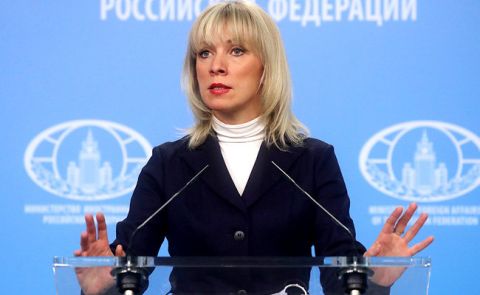
Maria Zakharova Warns Azerbaijan to Respect Russia’s Sensitivities on NATO Expansion, Criticizes EU Mission in Armenia
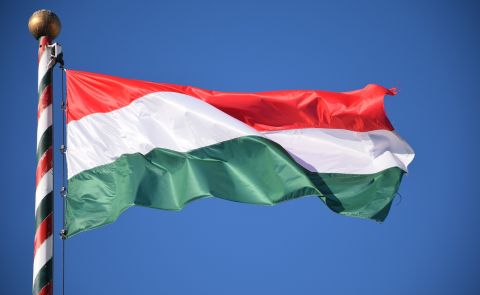
Hungary Provides Expert Assistance to Georgia’s EU Integration Process
